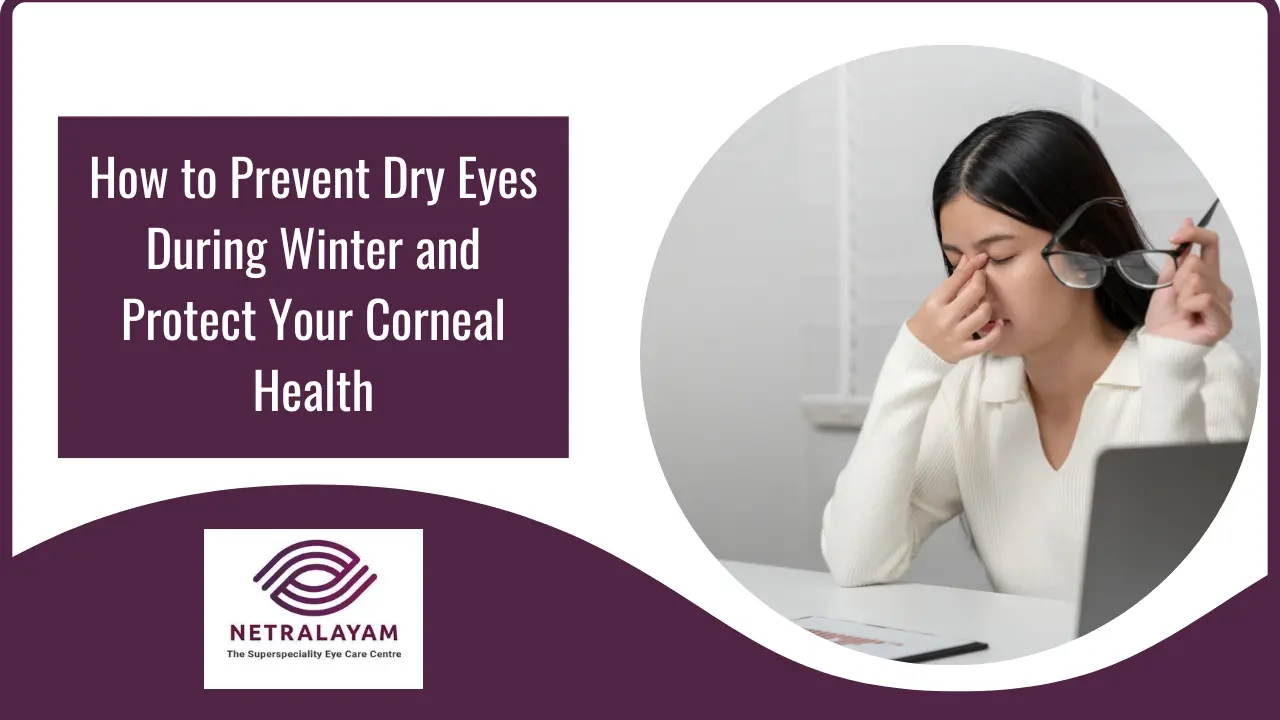Committed to Eye Care with Compassion, Technology and Competency
Committed to Eye Care with Compassion, Technology and Competency

11/27/2025
If your eyes often feel gritty, red, or watery during winter, you’re not alone. The combination of cold winds, low humidity, and indoor heating can strip away the natural moisture that keeps your eyes comfortable. As temperatures drop, so does the humidity, both outdoors and indoors, causing tears to evaporate faster than usual.
In urban settings, the problem worsens. Long hours of screen time, exposure to pollution, and air-conditioned or heated environments create a perfect storm for dry eyes. Pollution, in particular, plays a major role, and understanding how to protect your eyes from irritants can make a significant difference. But what many people overlook is how this seasonal dryness can affect corneal health, the clear front surface of your eye responsible for sharp vision. Keeping your cornea healthy isn’t just about comfort, it’s vital for protecting your sight.
Discover the real reasons your eyes feel dry every winter, and how protecting your cornea can preserve long-term eye health.
Dry eyes don’t happen by chance in the colder months, they’re the result of several everyday factors that quietly strip your eyes of their natural moisture. Here’s what’s really behind that winter irritation:
Winter air naturally holds less moisture. Indoors, heaters further reduce humidity, leading to faster tear evaporation and a feeling of constant dryness.
When cold air hits your face, the thin tear film on your eyes can evaporate almost instantly. Without enough protection, eyes begin to burn or sting within minutes outdoors.
While heaters make rooms cozy, they also dry the air dramatically. Sitting directly in front of one can leave your eyes feeling parched, especially if warm air is blowing toward your face.
Shorter days often mean longer evenings spent with screens. Unfortunately, focused screen use reduces blinking, sometimes by more than half, leading to less tear production and quicker evaporation.
Common signs of dry eyes from cold weather include:
If these symptoms persist or worsen, it’s best to see an eye specialist. Persistent dryness isn’t just uncomfortable, it can signal deeper issues affecting your corneal health.
The cornea acts as both a shield and a lens. For it to stay clear and comfortable, it needs a healthy layer of tears. When dryness interferes with that tear film, the cornea becomes vulnerable, particularly in periods prone to eye problems during winter.
For contact lens users, the challenge is greater. Lenses rely on tear moisture to stay comfortable, and in winter, that moisture evaporates faster, often leading to dryness, irritation, or a feeling of something “stuck” in the eye.
Humidifiers help restore lost moisture in the air, making your surroundings more eye-friendly. Place one in your bedroom or workspace for day-long comfort.
A warm compress encourages the tiny oil glands on your eyelids to work better, improving the quality of your tear film and preventing evaporation.
Every 20 minutes, look 20 feet away for 20 seconds. This simple habit reminds your eyes to blink and stay lubricated during screen use.
We often forget to drink enough water when it’s cold. But proper hydration is essential for healthy tear production and comfortable eyes.
Wear wraparound sunglasses or glasses to block cold winds and keep your tears from evaporating too quickly.
Lubricating eye drops can instantly relieve dryness. Opt for preservative-free formulations if you need to use them frequently, as they’re gentler on your eyes.
Keep heaters or blowers pointed away from your face to avoid further drying your tear film.
During winter, contact lenses may feel tight or uncomfortable due to dryness, especially if you’re unknowingly making common mistakes when wearing contact lenses.
Here’s how to manage it effectively:
You should consult an eye doctor if you experience:
Getting a professional evaluation early prevents complications such as corneal inflammation or infection, ensuring your vision remains clear and healthy through the colder months.
Cold winds and low humidity shouldn’t come between you and clear vision. At Netralayam, we help protect your corneal health with personalized solutions for winter dryness and irritation. From advanced diagnostics to expert care, our team ensures your eyes stay healthy, hydrated, and comfortable all season long.
Book your appointment today, let your eyes experience the comfort and clarity they deserve this winter.
Foods rich in omega-3 fatty acids, vitamins A, C, and E, and antioxidants help support tear production and maintain a healthy tear film.
Nighttime dryness is common due to reduced blinking and indoor heating. Using a humidifier and lubricating eye gel before bed can help.
Prolonged untreated dryness can disrupt the tear film and irritate the cornea. Early care prevents complications and keeps your eyes healthy and protected.
Preservative-free artificial tears are safest for frequent use during winter as they moisturize gently without irritating already sensitive eyes.
No, but lenses can worsen dryness if not managed properly. Using rewetting drops or switching to daily disposables helps protect long-term eye comfort.

Leave a Reply Cancel reply